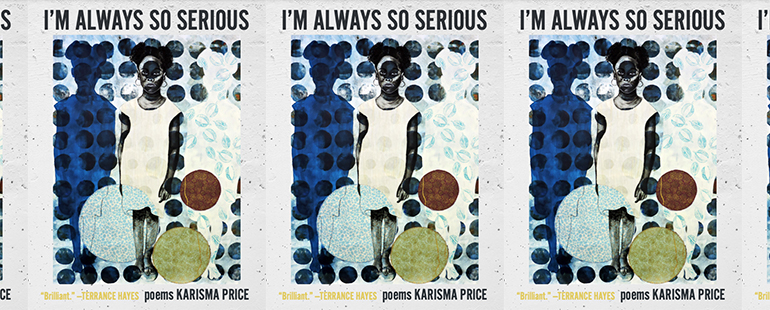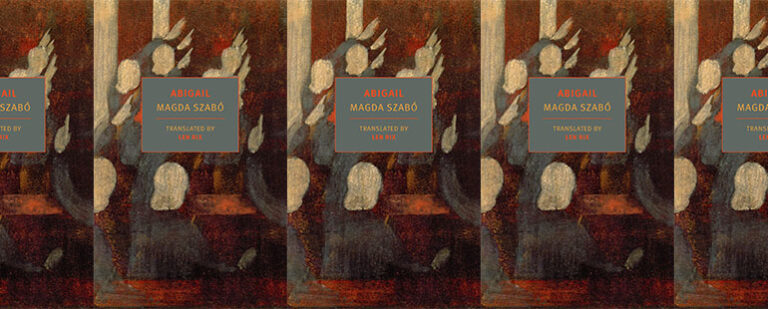Dreams and Death in Karisma Price’s I’m Always So Serious

Karisma Price’s I’m Always So Serious, out this week, is dedicated to “the Ones that raised me: my parents and New Orleans.” The book is a tender but powerful thing, something you want to cradle and not drop, for fear of hurting it, but also for fear of hurting yourself. It’s delicate like a glass knife, or, as Price writes in her poem “Ample,” “My book is a weapon no matter how I hold it.”
As a New Orleans poet, Price lives in a city, in a community, that lives with its ancestors, that lives with its past—the good, and the bad; the written histories and the oral stories. She lives in a city where her community is so strong and loving, but the people in power don’t love them back. She lives in a world where her loved ones always seem to be dying.
It should come as no surprise, then, that Price’s poems often play with dreams, with alternate realities. Price writes about these dreams, these alternate realities, by using metaphor, by making lists, in which one person, one object, one thought, lives different realities. Love poems here have the names of the dead. Poems repeatedly turn serious.
Price’s opening poem, “Self-Portrait,” is one such list poem, running down different thoughts: “As happiness, As the wailing tambourine / that replaced my uncle’s gun, As the dancing / it does when he waves it at the man who cut him / off, As the rattle of pills in my father’s / hands to slow the multiplying cells.” Each thought here bleeds into another; each thought leads from Price trying to write a poem about happiness but turning serious. Price continues until she gets to the speaker’s death, ending with: “As whatever’s / left of my skeleton after the family pet / has sucked the sorrow from every bit of my marrow.” For the speaker of the poem, the sorrow, the seriousness, feels like a physical entity, like something that she can’t get rid of, that she will only be rid of long after she dies and her bones have been picked clean.
The first “I’m Always So Serious” poem, of which there are five, starts: “I’m always so serious.” It goes on: “which is to say in the winters I dream…” The poem starts with the speaker dreaming of owning a house on St. Charles, the kind of house “that would only / see the likes of me if I were / the maid, the midwife, the family / mechanic, Archie Manning, / the maintenance worker…” Even dreams, here, are weighed down by the realities of an unjust world in which people like Price don’t own homes in certain neighborhoods. The speaker needs to find an “excuse,” a reason, to dream of being in the house.
The speaker of the poem talks about how in this dream, they are is a mail carrier, and they talk for a moment about crushing marigolds. Here we get a new stanza: “Looking back, this poem / was only supposed to / be about my sinuses, / how, even in my dreams, / I sneeze at the sight / of untended weeds.” This diversion is not just about the house the speaker would love to make a home, but also about how the poems are coming out more serious, more layered, how the physical (the sinuses) bleed into the generational issues and struggles for home (the fact that even in the city of New Orleans, a city built by the magic and beauty of Black people, so many still can’t even dream of living in houses in certain neighborhoods). “The nightmare is supposed to be my allergies,” the poem reads, “how they only allow / me to love what blooms / from a distance, but in every / dream those vibrant marigolds / keep growing.” What the body physically rejects bleeds into the speaker’s thoughts about home, and about loving those who have died and will die. The poem turns serious.
This duality can be shown no clearer than in the phrase “depression cupcakes,” which appears in “Poem at the End of the World (Or Last Week’s Dream).” In this poem, Price writes about being at a party with a professor, who is dying and feeding her and others. The poem shifts, as Price writes about all the ways she didn’t die, through disease, through murder of voting rights, through a gas leak. Price writes about how she “restocked the toilet paper because there is a possibility I may come back as a ghost and my ghost-self may have the same stomach issues as my flesh-self.” Price can’t imagine a life, or an afterlife, without the pains of this world, stomach or otherwise. One of the guests of the party tells the dying professor that “You should make this again.”
In the fourth “I’m Always So Serious” poem, the speaker starts with a declaration and a desire: “Old enough to know I cannot continue living / in metaphor, I tell you I want to exist / without interference.” The speaker understands that they can’t just live in these poems, in daydreams, in a non-physical world—even in these poems, in these pages, there are the interferences they are wishing to avoid. Here, the poem’s interruptions are stars, which come from a concussion. The speaker’s life is interrupted, which interrupts the life of their friend, who has to take them to a doctor to get checked up. The speaker of the poem doesn’t want to be an interference: “Friend, don’t let me / interrupt your living. Let me / tell you this while the metal carries us: / I care that you are cared for.” Price writes this and the poem’s ending line—“We sit in the clack clack of movement”—hoping that these pages can help them get lost in the real world, since the opposite has been unable to happen.
In Price’s I’m Always So Serious, she writes about home, about love, about death. She uses so many metaphors, so many analogies, to capture how dreams bleed into reality, and vice versa. In the poem “A Woman Lovingly Strokes Her Lover’s Arm in the Bookstore Because They’re In Love,” she writes: “I can never write / a love poem that doesn’t end / with death so here is a list of the dead: Jackie, / Franklin, Maria…” There is no unnamed love in these pages, in Price’s poems, in her world. The next poem in the book, “All the Men I Love,” ends with the line “I’m reminded that everyone I love is dying.” Earlier, Price writes: “Who would the living be / without the dead in the ground?” Because Price can’t separate the two. Price is writing about a world where so many people in her community, her hometown, haven’t been able to make a home where they and their loved ones can all be safe together. There is no world where our loves live without death, and there is no home safe from the constant threats (and acts) of death.


